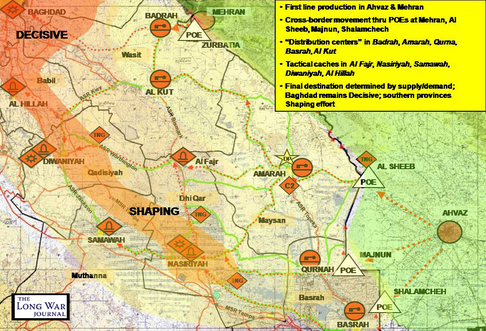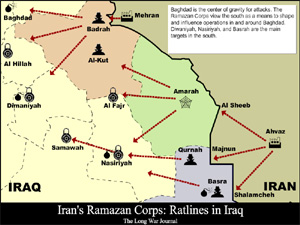|
A US military map of Iran’s operations inside southern Iraq. This 2007 map formed the basis of The Ramazan Corps and the ratlines into Iraq. Click to view full size. |
Iraqi troops continue to encounter Iranian agents in eastern Iraq. One Iranian was killed and another was captured during a clash in Al Kut in Wasit province, an Iraqi Army officer told Voices of Iraq.
“The forces killed and detained the two Iranians during clashes that broke out in Sheikh Saad district in south of Kut,” Major Aziz Latief, an officer from the 2nd Quick Reaction Force told the Iraqi newspaper.
The men were armed with four machine guns and hand grenades. The captured Iranian agent admitted “they came from Iran to implement armed operations in Iraq.”
Al Kut has been a center of Iranian activity in Iraq’s east. The city served as a strategic distribution hub for weapons smuggled into Iraq from across the border in Mehran, Iran. From there, weapons were distributed to tactical locations, where they were employed against Iraqi and Coalition forces as well against Iraqi politicians. The Iraqi Army dislodged the Iranian-backed Mahdi Army from Al Kut during operations during the summer of 2008.
Iraqi forces have captured eight Iranian agents and killed one since Oct. 18. Iraqi police captured three armed Iranian Revolutionary Guards Corps officers in Al Kut on Oct. 20. Border guards captured four more in Mandali in Diyala province, which also borders Iran.
All nine Iranians are likely members of Qods Force, the elite special operations branch of the Iranian Revolutionary Guards Corps. Qods Force has established a command to direct operations inside Iraq, and has been working to undermine Iraq’s security and political environment.
The recent surge of Iranian operatives killed or captured over the past week indicates Qods Force may be ramping up operations inside Iraq, and that Iraqi intelligence on Iranian activities is improving, a US military officer familiar with Iran’s operations in Iraq told The Long War Journal. Qods Force may also be looking to take a more active role in directing operations at the tactical level inside Iraq, the officer said. Prior to this week, only a handful of Iranian operatives, along with a Lebanese Hezbollah leader, have been reported captured inside Iraq.
Iraqi and Coalition forces have maintained the pressure on the Iranian-backed terror groups operating inside Iraq during the month of October. Two Iranian-trained Special Groups fighters have been killed and 76 have been captured during raids since Oct. 1, according to numbers compiled by The Long War Journal. Fifty-three have been captured since Oct. 13. Fourteen of those captured were members of the Hezbollah Brigades. The Hezbollah Brigades is an Iranian-backed terror group that has been behind multiple roadside bombings and rocket attacks against US and Iraqi forces in Baghdad.
Background on Iran’s backing of the Shia terror groups
|
Flash Presentation on the Ramazan Corps and the Iranian Ratlines into Iraq. Click the map to view. A Flash Player is required to view, click to download. |
Qods Force has supported various Shia militias and terror groups inside Iraq, including the Mahdi Army, which it helped build along the same lines as Lebanese Hezbollah. Iran denies the charges, but captive Shia terrorists admit to being recruited by Iranian agents, and then transported into Iran for training.
Iran established the Ramazan Corps immediately after the fall of Saddam Hussein’s regime to direct operations inside Iraq. The US military says Iran and Lebanese Hezbollah have helped establish, fund, train, and arm, and have provided operational support for Shia terror groups such as the Hezbollah Brigades and the League of the Righteous. The US military refers to these groups as well as the Iranian-backed elements of the Mahdi Army as the “Special Groups.” These groups train in camps inside Iran.
US and Iraqi forces have captured several high-level Qods Force officers inside Iraq since late 2006. Among those captured are Mahmud Farhadi, one of the three Iranian regional commanders in the Ramazan Corps; Ali Mussa Daqduq, a senior Lebanese Hezbollah operative; Qais Qazali, the leader of the Qazali Network; and Azhar al Dulaimi, one of Qazali’s senior tactical commanders. The US has imposed sanctions on Major General Ahmad Foruzandeh, the former Qods Force commander, and Abdul Reza Shahlai, a deputy commander in Iran’s Qods Force, for backing Shia terror groups inside Iraq.










5 Comments
On a related topic, the Washington Post reported yesterday that in Sadr City,
“Many Mahdi Army fighters who battled U.S. and Iraqi troops this year have returned to their jobs. But they still patrol their streets at night. Residents watch for strangers or U.S and Iraqi soldiers. Sadr’s office continues to provide cooking oil and other basic items and services to residents.”
Can anyone here assess the accuracy of these statements? I was under the impression that the GoI was not ceding its authority in Sadr City at night, and while the Mahdi Army agreed to transform into a primarily ‘humanitarian’ organization, there was far less need for them to hand out cooking oil, etc., since the crackdown.
Anyone with better/credible info?
The Thunder Run has linked to this post in the blog post From the Front: 10/24/2008 News and Personal dispatches from the front and the home front.
I was thinking, ISF seems to be doing a pretty good job lately of putting this Iranian agents either in jail cells or body bags.
Given that you can almost set your watch to when Lebanon has some sort of mini-civil war, maybe the time will come when the Arab League can send an Iraqi-led peacekeeping mission. I’m sure the Iraqi Army wouldn’t mind handing out some punishment to Iranian agents.
Is it just me or does it seem that these Iranian “agents” don’t have much of a stomach for a fight? They seem pretty quick to surrender.
Bill- Do you know how many hunter-killer teams,made up of the alledgedly elite revolutionary guard units, sent into Afghanistan in late 2001 to hunt US Special Ops, were killed by US operatives?
I have heard numbers from 100-200 that were eliminated.
Those “elite” teams from Iran entered as hunters and quickly became the hunted.